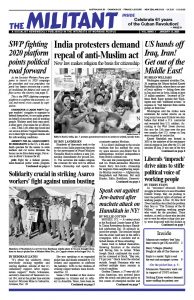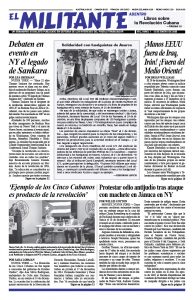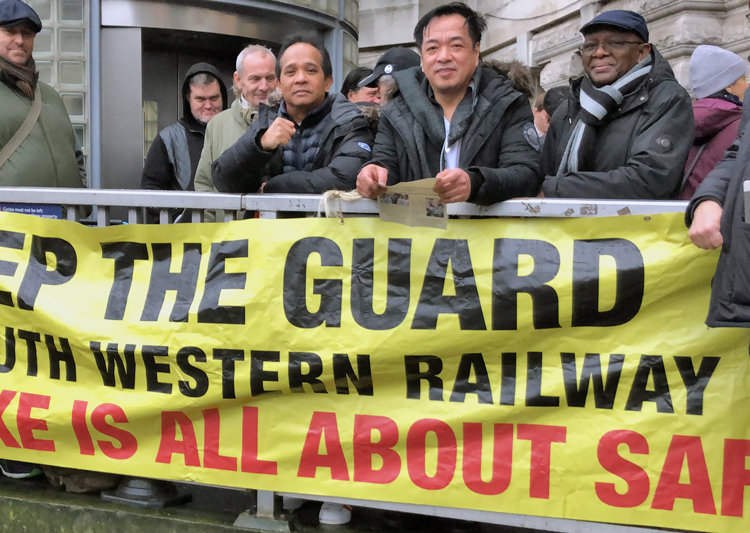LONDON — Boris Johnson claimed his Conservative Party’s huge electoral victory, built on an overwhelming working-class vote, was the “starting gun being fired on what promises to be a fantastic year and a remarkable decade for our United Kingdom.” But claims that the instability that has wracked politics in the U.K. in recent years are over are a pipe dream. The weakness, heterogeneity and loss of nerve of the British ruling class was not the result of a two-year hung Parliament. It has been decades in the making as their military and economic forces decline amidst capitalism’s spreading world disorder.
Johnson thanked those who do not consider themselves “natural Tories” for “lending” him their vote following his promise to take the U.K. out of the European Union. Faced by the refusal by big business, the liberal media, capitalist politicians of all stripes, including Labour, and union leaders, to implement the 2016 referendum result to leave the EU, millions of workers responded to Johnson’s pledge to get out. “I voted Conservative because I wanted to get Brexit sorted, to get it over and done with. I’ve had enough of it,” John Wilkinson, 55, a worker at the Tulip meat factory in Manchester, told the Militant.
Whether Johnson is capable of turning these “lent” votes into a long-term shift in working-class political support is far from assured.
Johnson’s insistence on his “One Nation Conservatism” — a claim to bring “rich and poor” together under the banner of “one nation” — is itself a recognition of the nervousness within the capitalist class about what’s brewing in the working class: the deep-seated anger, including the alienation from the entire capitalist political setup.
Labour Party doesn’t defend labor
The Labour Party itself has been dealt a body blow for this very reason. Under the impact of the capitalist crisis and shifts within the party itself, working-class support has moved away from Labour in every election since 1997. Jeremy Corbyn, the Labour leader that led the electoral debacle, has followed the course begun by former Prime Minister Anthony Blair to transform Labour into a middle-class liberal big city party. Corbyn has spearheaded attacks on working-class consciousness under the banner of “identity politics.”
Workers looking for answers to deteriorating conditions of life and work, for jobs, health care and housing, and no more Grenfell Tower-style disasters, saw Corbyn’s bourgeois socialist Labour Party seek electoral support in more middle-class areas that had voted for the U.K. to remain in the EU.
Corbyn’s supporters then turned upon “stupid, backward” workers for rejecting Labour’s promotion of a “social Europe.” A section of the working class “deserted us,” Paul Mason wrote in the New Statesman. He claimed in the areas where Johnson took votes from Labour “there is now a toxic narrative of nativism and xenophobia.”
Such sneering anti-working-class contempt, in the mold of Hillary Clinton’s depiction of Donald Trump supporters as “deplorables,” goes back years in the Labour Party.
In 2014 Emily Thornberry, now a candidate to replace Corbyn as leader, posted a picture of a worker’s home with an English flag and van outside, labeling the resident “white van man.” Four years earlier in the 2010 election, Prime Minister Gordon Brown was caught on TV complaining to his aides about why a lifelong Labour Party supporter — a “bigoted woman” in Brown’s invective — had been allowed to asked him about immigration.
The revolt against Labour was also a rejection of this “wokeness.” Every time Labour attacked Johnson for an un-“politically correct” statement, the Conservative Party won more votes.
During the campaign Corbyn refused to apologize in a BBC interview for persistent anti-Semitic remarks by Labour leaders, an example of how Jew-hatred endures in capitalist politics today and won’t go away. Labour’s anti-Semitism was not a decisive factor in the election result. There has been a decline in anti-Semitism in the working class and many workers were repelled by Corbyn’s position.
None of this implies that the shift in votes to the Conservatives means workers are becoming more reactionary.
The government will honor its commitment for the U.K. to leave the EU’s political institutions on Jan. 31, but negotiations over trading relations with these rivals in the protectionist bloc have yet to begin. EU officials cast doubt on completing them in the 11-month “transition” period and make no secret of their plan to extract the most concessions possible. The new government will be effected in these negotiations by the U.K.’s long-term decline against its rivals.
The U.K.’s rulers have military bases around the world. But their armed forces have declined in strength, numbers and quality. The army totals 73,000 — down from 102,000 at the time of the 2003 Iraq war. The navy is less than half its 1990 size.
The economy has dropped to sixth in the world and growth has stagnated as profit rates and industrial investment fall. Without economic and military clout, the pound sterling is increasingly irrelevant as a reserve currency.
And the United Kingdom itself is under strain. Demands for a second Scottish independence vote immediately followed the Scottish National Party’s landslide electoral victory north of the border. And pressures toward a united Ireland are increasing. Johnson’s Brexit deal negotiated with Irish Prime Minister Leo Varadkar and the EU drew a customs line down the Irish Sea just as all-Ireland economic, social and cultural life is increasing.


